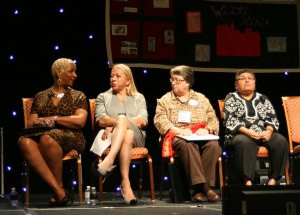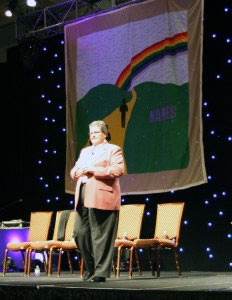
|
U.S. Conference on AIDS - Highlights from Day 1
October 1, 2012
By Vera Yakovchenko , MPH, Public Health Analyst, Office of HIV/AIDS and Infectious Disease Policy, U.S. Department of Health and Human Services
The annual U.S. Conference on AIDS (USCA) opened on Sunday, September 30, 2012. Among the highlights were two
plenary sessions engaging the audience of over 2,000 in exploring important topics related to aligning efforts to end the
HIV/AIDS epidemic.
Spotlight on HIV/AIDS among Women
 "Not without women will we turn
the tide on HIV/AIDS," declared the first plenary session's facilitator, Ms. C. Virginia Fields,
President/CEO, National Black Leadership Commission on AIDS . Putting the spotlight on women and
HIV/AIDS in America, she shared the latest CDC data indicating that more than 260,000 U.S. women are living with HIV, comprising 24%
of all diagnoses of HIV infection in the country. The data also show that women of color, particularly Black women, have been
especially hard hit and represent the majority of new HIV infections and AIDS diagnoses among women, and the majority of
women living with the disease. Her remarks laid the foundation for a series of presentations by women leaders from the
HIV community discussing what is and can yet be done to turn the tide of the epidemic among women: "Not without women will we turn
the tide on HIV/AIDS," declared the first plenary session's facilitator, Ms. C. Virginia Fields,
President/CEO, National Black Leadership Commission on AIDS . Putting the spotlight on women and
HIV/AIDS in America, she shared the latest CDC data indicating that more than 260,000 U.S. women are living with HIV, comprising 24%
of all diagnoses of HIV infection in the country. The data also show that women of color, particularly Black women, have been
especially hard hit and represent the majority of new HIV infections and AIDS diagnoses among women, and the majority of
women living with the disease. Her remarks laid the foundation for a series of presentations by women leaders from the
HIV community discussing what is and can yet be done to turn the tide of the epidemic among women:
- Ensuring that prevention and care efforts focus not only on individual risk and vulnerability but also on structural factors and social determinants of health that also influence HIV, such as intimate partner violence, poverty, housing instability, and unemployment.
- Working to better understand and address the roles that trauma and violence pose to both HIV risk and suboptimal treatment outcomes for women. On this point, a panelist praised the recently established White House Working Group on the Intersection of HIV/AIDS, Violence Against Women and Girls, and Gender-Related Health Disparities .
- Expanding efforts to understand and address the unique HIV risks and HIV care needs of transgender women.
One way to better address the needs of women at risk for or living with HIV, suggested one participant, is ensuring that
communities are prepared to take full advantage of the implementation of the Affordable Care Act (ACA).
Dr. Bambi Gaddist, Executive Director, South Carolina HIV/AIDS Council , urged participants
to "do their homework" about the ACA, stressing the importance of understanding the changes and opportunities that are unfolding and
ensuring that they are able to help inform state-level decisions being made now and in the coming months that will impact health
care options for women at risk for and living with HIV.
A key takeaway for participants from this session was Ms. Fields' call for a greater sense of urgency to address
women living with and at risk for HIV/AIDS in programs, funding, research and leadership at the community, state, regional and
national levels.
SAMHSA Administrator Highlights Importance of Addressing Behavioral Health as Part of Efforts to End HIV
 The first
plenary session also featured Ms. Pamela Hyde, Administrator of the Substance Abuse and
Mental Health Services Administration (SAMHSA), who shared highlights of SAMHSA's efforts to address HIV/AIDS while working to
reduce the impact of substance abuse and mental illness on America's communities. In discussing behavioral health challenges and
opportunities to help to end the HIV/AIDS epidemic, she reiterated that violence and trauma are significantly associated with
increased risk for HIV infection and that untreated behavioral health disorders are among the top predictors of poor HIV
treatment adherence. She also noted the importance of addressing co-morbid mental health conditions experienced
by an estimated 50 percent of people living with HIV and expressed optimism that the Affordable Care Act's
provisions supporting integrated and coordinated care will have a positive effect on the nation's
ability to better address those conditions. Ms. Hyde also briefly discussed SAMHSA's role in
implementing the National HIV/AIDS Strategy, highlighting efforts underway at the agency
to carefully align its portfolio of HIV grants - many supported by the Minority AIDS
Initiative- with the Strategy. She also highlighted SAMHSA's participation in the
cross-HHS efforts to establish seven common core indicators for
monitoring HHS-funded HIV prevention, treatment, and care services a common set of core of indicators for use across all HIV/AIDS programs
funded by the Department. The first
plenary session also featured Ms. Pamela Hyde, Administrator of the Substance Abuse and
Mental Health Services Administration (SAMHSA), who shared highlights of SAMHSA's efforts to address HIV/AIDS while working to
reduce the impact of substance abuse and mental illness on America's communities. In discussing behavioral health challenges and
opportunities to help to end the HIV/AIDS epidemic, she reiterated that violence and trauma are significantly associated with
increased risk for HIV infection and that untreated behavioral health disorders are among the top predictors of poor HIV
treatment adherence. She also noted the importance of addressing co-morbid mental health conditions experienced
by an estimated 50 percent of people living with HIV and expressed optimism that the Affordable Care Act's
provisions supporting integrated and coordinated care will have a positive effect on the nation's
ability to better address those conditions. Ms. Hyde also briefly discussed SAMHSA's role in
implementing the National HIV/AIDS Strategy, highlighting efforts underway at the agency
to carefully align its portfolio of HIV grants - many supported by the Minority AIDS
Initiative- with the Strategy. She also highlighted SAMHSA's participation in the
cross-HHS efforts to establish seven common core indicators for
monitoring HHS-funded HIV prevention, treatment, and care services a common set of core of indicators for use across all HIV/AIDS programs
funded by the Department.
Wendy Williams, Magic Johnson, and Other Guests Discuss Ending HIV in America
 Ms. Wendy Williams hosted the day's second plenary session, a special edition of her talk show featuring several guests including Magic Johnson. Among her guests was Dr. David Malebranche, a physician and researcher from the University of Pennsylvania, who examined some of the significant ways that HIV prevention, testing, and treatment have evolved over time, becoming ever more closely integrated. While hailing the great advances in biomedical approaches to prevention, Dr. Malebranche echoed one of the themes of the morning plenary when he observed that "HIV is a human disease and it follows structural inequities" which must also be addressed if we are to reach the goal of ending HIV/AIDS. Highlighting the "not so new face of HIV in America: young Black gay and bisexual men," he urged continued attention to such disproportionately affected populations while cautioning the audience not to undertake such targeted efforts at the expense of universal HIV prevention messages, arguing that both are
necessary. Ms. Wendy Williams hosted the day's second plenary session, a special edition of her talk show featuring several guests including Magic Johnson. Among her guests was Dr. David Malebranche, a physician and researcher from the University of Pennsylvania, who examined some of the significant ways that HIV prevention, testing, and treatment have evolved over time, becoming ever more closely integrated. While hailing the great advances in biomedical approaches to prevention, Dr. Malebranche echoed one of the themes of the morning plenary when he observed that "HIV is a human disease and it follows structural inequities" which must also be addressed if we are to reach the goal of ending HIV/AIDS. Highlighting the "not so new face of HIV in America: young Black gay and bisexual men," he urged continued attention to such disproportionately affected populations while cautioning the audience not to undertake such targeted efforts at the expense of universal HIV prevention messages, arguing that both are
necessary.
Ms. Williams then welcomed Ms. Dázon Dixon Diallo, founder of Atlanta's SisterLove , who shared
thoughts on how the treatment cascade can
help us end HIV/AIDS. She urged participants to "study the cascade, use it, spend time figuring out what it means for your organization
and your community." She suggested that such an understanding could help an organization determine where each of its programs and
activities fits - or does not - in helping to improve the cascade for their specific population(s) of interest.
Finally, Mr. Earvin "Magic" Johnson, Jr. joined Ms. Williams for a candid conversation about his experience living with HIV for the
past 21 years. He observed that he enjoys good health today because early detection of his HIV infection likely saved his life. He
also pointed to the important role that starting HIV treatment and staying adherent has played in his continued good health. On
that point, he clarified for Ms. Williams that "no, I'm not on magical drugs; the same drugs available to everyone else are
the ones available to me." The third factor Mr. Johnson attributed his health to was the support and understanding of his
wife, parents, teammates, and friends. Mr. Johnson then highlighted some of the work
his Magic Johnson Foundation supports to educate young people
and engage churches and schools in HIV education. He also praised and thanked the conference participants from across the
nation for the work they are each doing to respond to HIV/AIDS in America and urged them sustain and grow their
passion for their work while also being willing to change and re-tool their approaches and even their
organizations as HIV in America continues to evolve. He brought the audience to their feet with a
call for each of them to be "all in to end HIV" by playing their roles at the highest level they
can and working together collaboratively to capitalize on new opportunities.
Tune in tomorrow for highlights from the second day of the conference.
###
Source: http://blog.aids.gov/2012/10/u-s-conference-on-aids-highlights-from-day-1.html
For more HIV and AIDS News visit...
Positively Positive - Living with HIV/AIDS:
HIV/AIDS News
|